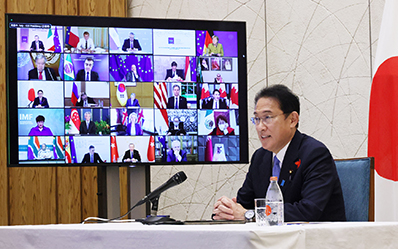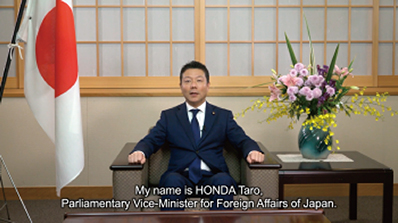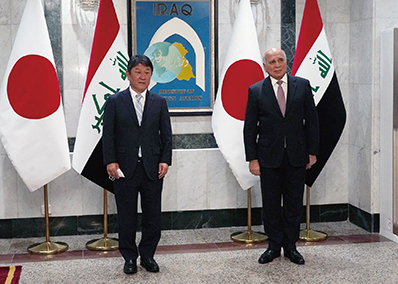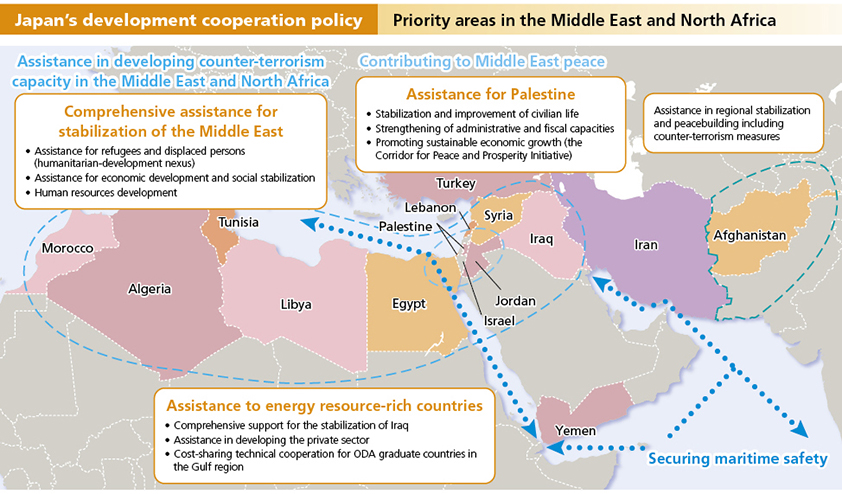7 Middle East and North Africa
Japan depends on the Middle East and North Africa region for approximately 90% of its crude oil imports, and the region, as a key point for global distribution, is critically important from the perspective of Japan’s economy and energy security. It is also a region with high potential and expectations for future growth due to its high rate of population increase, resulting in the expansion of the youth population.
At the same time, the region faces wide-ranging issues such as the Middle East Peace, political turmoil since “the Arab Spring,” and heightened tensions surrounding Iran. In particular, conflict in Syria has continued and has brought about a large number of refugees and internally displaced persons, seriously affecting the stability of the neighboring countries and the entire region. In addition, after the Taliban’s takeover in Afghanistan in August 2021, humanitarian needs have increased in the country as well as in neighboring countries. Furthermore, the risk of proliferation of violent extremism such as the Islamic State of Iraq and the Levant (ISIL) still remains in various areas.
● Japan’s Efforts
Peace and stability in this region are extremely important for the stability and prosperity of the international community as a whole, including Japan. Thus, there is a need to provide support through such means as economic assistance and human resources development to achieve sustainable peace and stability in the region.
■ Support in Response to COVID-19

Prime Minister Kishida attending the G20 Extraordinary Leaders’ Meeting on Afghanistan (Photo: Cabinet Public Affairs Office of the Government of Japan)
In 2021, Japan provided various assistance in response to COVID-19. In July 2021, Japan provided approximately 2.91 million vaccine doses manufactured in Japan to Iran through the COVAX Facility. In December, Japan also provided vaccines to Egypt and Syria, and decided to provide additional doses to Iran. In addition, in November 2021, Japan extended an ODA loan of ¥11 billion to support Jordan as it works on COVID-19 countermeasures, through the framework of the COVID-19 Crisis Response Emergency Support Loan.
■ Support for Syria, Iraq, Lebanon, and the neighboring countries
With regard to the Syria issue, which is a pressing concern for the international community, Japan announced the provision of assistance at the fifth Conference on “Supporting the Future of Syria and the Region” (Brussels V Conference) held in March 2021, and swiftly carried out the assistance totaling approximately $200 million. This assistance includes humanitarian aid and support for social stabilization for Syria and its surrounding countries.
In August 2021, during then Foreign Minister Motegi’s visit to Turkey, an Exchange of Notes was signed regarding the provision of an ODA loan of up to ¥45 billion for the purpose of improving the social infrastructure affected by the influx and prolonged stay of Syrian refugees to Turkey, the world’s largest host country for Syrian refugees.
As for Iraq, Japan is providing assistance through ODA loans and other means in the oil and gas sector, which are the foundation of its economy, and in the electricity, water, and sewage sectors, which are basic services, as well as support for human resources development through training and dispatching experts. In addition, Japan is making efforts to support the strengthening of governance in order for Iraq to develop as a stable and independent democratic state (see also Part II, 2-1 “(3) Assistance for Democratization”).
Since the outbreak of the Syrian crisis in 2011, Japan’s assistance to Syria, Iraq, and the neighboring countries has reached over approximately $3.2 billion. In these ways, Japan provides timely and effective assistance to the region in response to the ever-changing humanitarian landscape (see also Part II, 2-2 (1) Support for Peacebuilding and Refugees/Displaced Persons).
Japan also provides support for human resources development and self-reliance of refugees. Japan accepted 108 Syrian students from FY2017 to 2021 to foster human resources who will contribute to Syria’s recovery in the future.
■ Assistance to Yemen
Yemen is facing the “world’s worst humanitarian crisis” with approximately 80% of its population in need of some form of humanitarian aid due to the prolonged conflict. In this context, Japan has provided a total of over approximately $300 million in humanitarian aid to the country as a major donor country, through international organizations over seven years from 2015 to 2021. In 2021, in addition to humanitarian aid through international organizations, Japan also conducted education and training programs in Japan, including accepting Yemeni students through Japanese Government Scholarships and conducting training for Yemeni experts through JICA, in order to foster human resources to back up Yemen’s self-reliant stabilization.
■ Assistance to Afghanistan

Parliamentary Vice-Minister for Foreign Affairs Honda issuing a video message at the Ad Hoc Liaison Committee (AHLC) Ministerial Meeting (November 2021)
As humanitarian needs have increased in Afghanistan and neighboring countries since the fall of Kabul to the Taliban in August 2021, Japan has been actively participating in international meetings, including the expanded ministerial meeting on Afghanistan co-hosted by the United States and Germany (September 2021, attended by then Foreign Minister Motegi), the High-level Ministerial Meeting on the Humanitarian Situation in Afghanistan held by the United Nations (September 2021, attended by then State Minister for Foreign Affairs Washio), and the G20 Extraordinary Leaders’ Meeting on Afghanistan held by Italy (October 2021, attended by Prime Minister Kishida). During these meetings, Japan stated its policy for humanitarian aid and emphasized the importance of ensuring the safety of aid workers and humanitarian access.
Based on the policy announced at the above meetings, in October 2021, Japan decided to extend Emergency Grant Aid of $65 million through international organizations in such areas as shelter, health, water and sanitation, food, agriculture, and education. As of December 2021, the projects are being implemented. Including this assistance, Japan provided a total of approximately $200 million (approximately ¥22 billion) to Afghanistan during 2021. In addition, in December of the same year, Japan decided to contribute additional assistance totaling approximately $109 million from the FY2021 supplementary budget through international organizations.
Since 2001, Japan has hosted two ministerial-level support meetings (2002 and 2012) and has provided development assistance in various fields such as humanitarian aid, health, education, agriculture and rural development, and women’s empowerment, in order to achieve Afghanistan’s sustainable and self-reliant development. With regard to future assistance to Afghanistan, Japan will promptly implement the aforementioned humanitarian aid and respond appropriately after carefully assessing the needs of the country in close cooperation with the international community.
■ Middle East Peace (Assistance to Palestine)

Then Foreign Minister Motegi in the meeting with Foreign Minister Hussein of Iraq during his visit to the Middle East (August 2021)
Japan has positioned its assistance to Palestine as one of the important pillars of its measures to contribute to Middle East peace and has provided more than $2.1 billion in assistance since the 1993 Oslo Accords. Specifically, Japan provided various types of humanitarian assistance through international organizations and NGOs to improve the severe living conditions of the socially vulnerable people in the West Bank including East Jerusalem, people affected by conflicts in the Gaza Strip, and others. In May 2021, there were clashes between Palestinian militants and Israel, which caused extensive damage to the Gaza Strip. In response to the situation, the Government of Japan provided assistance on the scale of $23 million through support in the fields of food, debris removal, water and sanitation, and health and medical care, as well as cold chain Note 21 development for COVID-19 vaccines and food aid through the United Nations Relief and Works Agency for Palestine Refugees in the Near East (UNRWA).
Japan is also engaged in a wide range of efforts, including to stabilize and improve the daily lives of Palestinians, strengthen the financial foundation, and enhance the quality of administration, aimed at preparing for the Palestinian nation-building in the future and for a self-sustained Palestinian economy. During then Foreign Minister Motegi’s visit to Palestine in August 2021, he visited the Jericho Agro-Industrial Park (JAIP), Note 22 the flagship project of the “Corridor for Peace and Prosperity” initiative, and attended the opening ceremony for the Palestine Business Prosperity Center built with support from Japan. Furthermore, in order to support the financial situation of the Palestinian Authority, which has been weakened by the socio-economic impact of the COVID-19 pandemic and measures against it, Japan provided ¥1 billion in grant aid in November 2021.

- Note 21: See Note 2.
- Note 22: Since 2006, Japan has launched the initiative of the “Corridor for Peace and Prosperity” as its unique medium to long-term initiative that aims to promote socio-economic development in the Jordan Valley area through regional cooperation among Japan, Israel, Palestine, and Jordan, and provides support for the development of the Jericho Agro Industrial Park (JAIP) as the flagship project of the initiative. In May 2018, then Prime Minister Abe visited the JAIP during his visit to Palestine.
